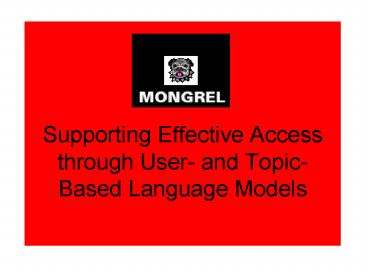Supporting Effective Access through User- and Topic-Based Language Models - PowerPoint PPT Presentation
1 / 11
Title:
Supporting Effective Access through User- and Topic-Based Language Models
Description:
Bruce Croft & James Allan, Principle Investigators, U Mass ... Information retrieval and filtering tools make ... I want to buy some dark roast Java coffee. ... – PowerPoint PPT presentation
Number of Views:22
Avg rating:3.0/5.0
Title: Supporting Effective Access through User- and Topic-Based Language Models
1
- Supporting Effective Access through User- and
Topic-Based Language Models
2
Who we are
3
Specifics
- People
- Nick Belkin, Principle Investigator, Rutgers
- Bruce Croft James Allan, Principle
Investigators, U Mass - Diane Kelly, Graduate Assistant, Rutgers
- Jeong Hyun (Annie) Kim, Yang-woo Kim, Hyuk-Jin
Lee, Anne Washington, Rutgers - Funding
- NSF 99-11942, Rutgers awarded 243,771 for a
3-year period
4
The Problem
- Information retrieval and filtering tools make
mistakes that are obvious and aggravating to
users. - Queries are often totally misinterpreted by
search tools and, even when relevant documents
are found, they are usually mixed with many
others that are totally unrelated. - WHY? Lack of adequate models of the user and of
the domain.
5
General Solution
- Language Models
- Assume that associated with every document or
group of documents there are one or more
probability distributions that model how the text
in the document can be generated. - Can be viewed as models of the important topics
that are covered by a document or a group of
documents.
6
- Have the potential for representing topics of
interest to a user or a group of users. - Assume that different types of information
problems are expressed in language in different
ways. These different ways could be characterized
by language models understood as models of the
user.
7
Types of Language Models
- Topic-based
- Identify characteristics of the language that is
used in a particular domain or topic. - User-based
- Identify characteristics of the language that a
user or a group of users associate with a
particular domain or topic.
8
Overview of the Retrieval Process
9
An Example
- Consider the following information needs that
indicate a users interest in Java - I want to find the best and least expensive way
to have a 2 week holiday in Java. - I need to know where Java is.
- I need to write a brief survey of the current
political situation in Java.
10
- I need to learn the programming language Java.
- I want to buy some dark roast Java coffee.
- Consider the following premise Documents that
are relevant to each of these kinds of queries
will have different language characteristics
associated with them.
11
Our Goal
- To identify the language characteristics of each
of these types of needs (user) - To identify the language characteristics of the
groups of documents that satisfy each of these
types of needs (topic) - To match these needs and document clusters
accordingly





























